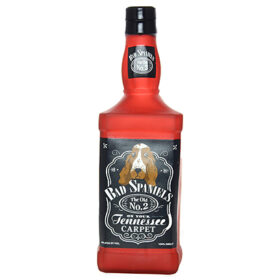THE TAIL WAGS THE DOG
Jack Daniel’s lawsuit goes to Supreme Court
The Supreme Court of the United States has agreed to hear a trademark case regarding a line of dog toys with ‘unsavoury themes’ that imitate well-known alcohol brands.

Jack Daniel’s first launched the lawsuit in 2018 against dog toy maker VIP Products over its Bad Spaniel’s Old No.2 on your Tennessee Carpet product. The dog toy is a replica of a Jack Daniel’s bottle with black labels and white text, and carries the wording ‘The Old No.2 on your Tennessee Carpet’.
The District Court ruled in favour of Jack Daniel’s over the likelihood that the infringing product would result in consumer confusion and that the company’s use of “juvenile bathroom humour” would tarnish the whiskey brand.
However, in March 2020, the US Court of Appeals for the Ninth Circuit ruled the toys were “expressive” works that carried a humorous message. As such, the First Amendment protected its use of similar trademarks and branding to Jack Daniel’s.

The Supreme Court did not elect to take up the case at that time and the case was remanded to the lower courts. However, the Distilled Spirits Council of the United States (Discus), joined by Beer Institute, Brewers Association, American Distilled Spirits Alliance, American Craft Spirits Association and Wine Institute, has now filed an amicus brief with the Supreme Court in support of Jack Daniel’s petition for review in the case, Jack Daniel’s Properties Inc versus VIP Products LLC.
The argument put forward by the associations in the brief is that “The Ninth Circuit’s decision threatens the alcohol beverage industry’s ability to promote responsible advertising that does not harm children”.
The brief presents two questions to the court: whether humorous use of another’s trademark as one’s own on a commercial product is subject to the Lanham Act’s traditional likelihood-of-confusion analysis, or instead receives heightened First Amendment protection from trademark-infringement claims; and whether humorous use of another’s mark as one’s own on a commercial product is ‘non-commercial’, thus barring as a matter of law a claim of dilution by tarnishment under the Trademark Dilution Revision Act.
Courtney Armour, Discus chief legal officer, said: “We are pleased that the Supreme Court has decided to hear this case. The alcohol beverage industry has long worked to ensure that our products are advertised in a responsible manner and trademark infringers can severely jeopardise these efforts.
“The Ninth Circuit opinion threatens to undermine our commitment to responsibility by inviting trademark infringers to pirate famous alcohol beverage brands so long as they add a humorous twist.
“This case involves dog toys, but it does not take much imagination to see how this could lead to ‘humorous’ products that encourage binge drinking and blacking out, underage drinking, or drunk driving. The industry must have control over their trademarks for responsible advertising initiatives to succeed.”
The group underscored in the brief the alcohol industry’s longstanding commitment to responsible advertising and effective self-regulation through their respective voluntary advertising, marketing codes and code review boards.
“These boards have successfully promoted compliance with the industry codes within the industry, on pain of being expelled from the association,” the brief stated. “But the boards have no ability to address irresponsible use of industry participants’ trademarks and trade dress by those outside the industry, whose marketing is not subject to industry rules.
“If non-industry participants can infringe members’ marks in a manner that promotes irresponsible drinking, that loss of control directly undermines the industry’s self-regulation. In short, policing such misconduct requires rigorous trademark enforcement and robust legal protection of members’ marks.”
No comments:
Post a Comment